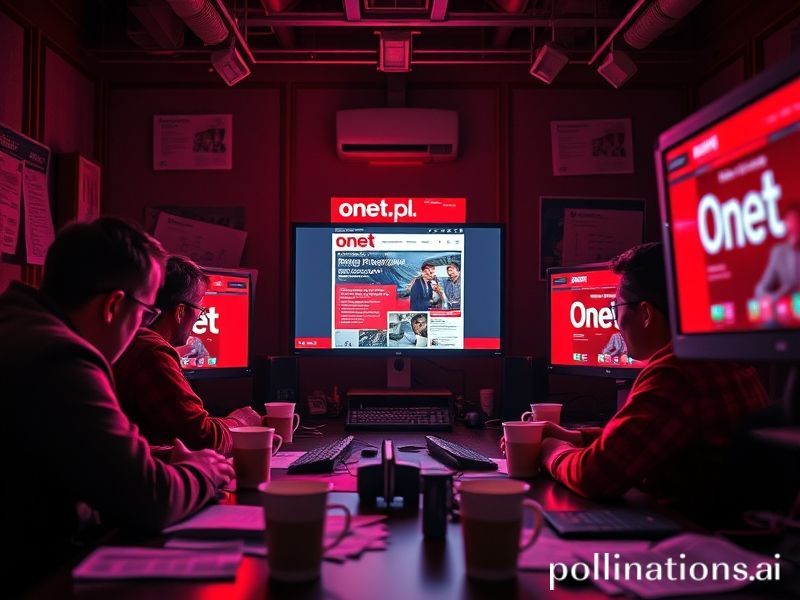How a Gray Polish Portal Named ‘onet pl’ Accidentally Became the Axis of European Anxiety
Warsaw, 03:14 a.m. local—While most of the planet was doom-scrolling inflation graphs or arguing about whether the ocean is actually on fire this week, one modest Polish web portal quietly chalked up its one-billionth click since January. The culprit? “onet pl,” a two-decade-old digital veteran that looks, at first glance, like the internet equivalent of a Soviet housing block: functional, slightly gray, and utterly uninterested in your aesthetic feelings. Yet its traffic numbers now rival those of BBC.com on a good royal-scandal day, making onet pl the geopolitical equivalent of discovering that your unassuming uncle is laundering money for three continents and a small navy.
To outsiders, the name sounds like an unfinished sentence—“One TPL? One Top-Level? One Toilet Paper Lament?”—but in Poland it is simply the place where grandmothers check whether it will hail tomorrow, teenagers stream pirated Champions League matches, and the government accidentally leaks next year’s budget while trying to upload a photo of the prime minister’s cat. In short, a national utility disguised as a homepage.
Zoom out and the implications become deliciously grim. Central and Eastern Europe have spent the last thirty years being lectured by Western consultants about “media pluralism” and “digital sovereignty.” Meanwhile, onet pl—majority-owned by Ringier Axel Springer, a Swiss-German conglomerate whose corporate structure resembles a Matryoshka doll designed by Kafka—has become the region’s most trusted source of information, mostly by being just tabloid enough to keep readers hooked and just respectable enough to keep advertisers from fleeing to Pornhub. If that sounds like a metaphor for the entire European project, congratulations: you’ve grasped the continental mood.
Globally, onet pl’s ascendancy is a case study in what happens when American tech giants get bored and look elsewhere for fresh blood. Google’s algorithm treats the portal like a favored nephew, Facebook’s news tab flirts with it shamelessly, and TikTok—God help us—now poaches its journalists with salaries denominated in “exposure” and dance trends. The result is a feedback loop in which local anxiety is monetized at Silicon-Valley margins, then repackaged back to the provinces as cosmopolitan concern. It’s cultural imperialism with a Polish accent, like being colonized by your own diaspora.
The darker punchline? Onet pl’s comment section—an intellectual Chernobyl where anti-vaxxers debate flat-Earthers under articles about municipal water rates—has become a petri dish for the next wave of European populism. Analysts at NATO’s strategic communications unit (yes, that’s a real job) now scrape the forum daily for early signs of Russian troll farms or Hungarian meme mercenaries. Last month, a sarcastic post about “importing Ukrainian pierogi recipes” spiraled into a seventy-three-country disinformation campaign alleging NATO plans to weaponize fermented cabbage. Somewhere in Moscow, a colonel updated his PowerPoint.
But perhaps the most exquisite irony is that onet pl’s global relevance stems from its absolute refusal to be globally relevant. Unlike the New York Times, which insists on teaching you how to feel about brunch in Gaza, onet pl keeps its gaze stubbornly parochial: bus-ticket prices in Katowice, snow forecasts for Zakopane, a live blog when a local elk wanders into a shopping mall. The world, starved for authenticity, interprets this myopia as integrity. Advertisers follow, algorithms salivate, and suddenly a site that still runs banner ads for discount funeral services is shaping the attention span of half a continent.
So here we are: a Polish portal that began life as a dial-up curiosity now sits at the crossroads of European neuroses, American tech dominance, and Russian psy-ops, all while looking like it was designed on a Nokia 3310. If that’s not a perfect emblem for the 21st century—equal parts resilience, absurdity, and creeping dread—then I’ve been filing from the wrong century entirely.
Time to close the laptop. The elk is back, and apparently it’s learned to open automatic doors.







